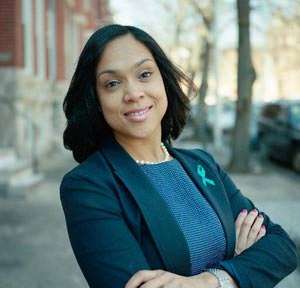Were the Cops in the Freddie Gray Case Charged Too Quickly or Too Much?
Law professors worry that fear of riots could compromise justice.

This morning I noted that the dispute about whether Freddie Gray's knife was banned by a Baltimore ordinance will make it hard to prove that the officers who arrested him lacked probable cause and are therefore guilty of false imprisonment. Another count that Marilyn Mosby, the state's attorney for Baltimore, may have trouble with is the second-degree "depraved heart" murder charge against Officer Caesar Goodson, who drove the police van in which Gray was fatally injured. Mosby alleges that Gray "suffered a severe and critical neck injury as a result of being handcuffed, shackled by his feet, and unrestrained inside the BPD wagon." To convict Goodson of second-degree murder, which carries a maximum penalty of 30 years in prison, she has to demonstrate beyond a reasonable doubt that his actions "created a very high risk" to Gray's life and that he acted "with extreme disregard" of that risk. That may be a stretch, even if she can show that Goodson deliberately gave Gray a rough ride, since such treatment rarely has fatal consequences.
Another charge Goodson faces, involuntary manslaughter, is easier to prove, since it includes deaths caused by negligence, an unlawful act (other than a felony), or failure to perform a legal duty. Based on Mosby's allegations, that charge, which carries a maximum penalty of 10 years in prison, also seems appropriate for Lt. Brian Rice, Officer William Porter, and Sgt. Alicia White, who are accused of repeatedly failing to belt Gray in and repeatedly failing to help him when it became clear he needed medical attention. Their alleged inaction may very well have amounted to negligence or failure to perform a legal duty.
In an interview with The Atlantic, University of Baltimore law professor David Jaros, a former criminal defense attorney who studies police abuse, says "it looks little bit like [Mosby] overreached" in charging Goodson with second-degree murder. But he adds that overcharging is a common, if regrettable, practice:
I love how surprised people are by the fact that a prosecutor may have overcharged. This is something prosecutors do all the time, as a strategic choice, for various reasons, and it's ironic that suddenly the [Fraternal Order of Police] is up in arms over this….
On a lower misdemeanor, they might throw in a charge of felony assault when it's really a misdemeanor assault, because they know that this going to go through a plea-bargaining process. It's also true that juries sometimes compromise, so if they're going to compromise, you stake out a strong position and then you settle for what you thought was appropriate in the first place.
Jaros also agrees it's reasonable to worry that Mosby—who filed charges just a day after police completed their investigation and who declared, in the wake of last week's rioting, "I heard your call for 'no justice, no peace'"—may have acted hastily for political reasons:
I think there are once again serious reasons to be concerned about the political pressure to come out quickly and charge very serious crimes because there was a very real interest in calming the city. We don't want those political interests to affect the prosecution of an individual defendant and their constitutional rights and what's going to happen to them. At the same time, that's what happens in tons of other cases.
To be clear: Jaros is not saying that politically motivated prosecutions or verdicts are good but rather that "we should have that concern in every case," not just in cases where the defendants are police officers.
Another defense attorney, Harvard law professor Alan Dershowitz, expresses similar concerns more forcefully in a Boston Globe op-ed piece:
No decision on charges should ever be made on the basis of satisfying the demands of demonstrators or under the threat of violent demonstrations. Crowd control is not a proper component of prosecutorial discretion and is inconsistent with due process. Prosecutorial discretion should be exercised on the basis of an objective application of the law to the facts and not on the basis of the impact it may have on the crowd….
No one can know for certain what motivated Mosby to charge six police officers with crimes ranging from second-degree murder to manslaughter to assault, in the unnecessary death of Freddie Gray. Perhaps she knows facts that justify these serious charges, though it is difficult to square her description of the timeline with the "depraved heart" murder charge against the driver of the van. But the appearance of crowd influence flows inexorably from her ill-chosen words, and the appearance of injustice must be avoided as studiously as the reality of injustice if our legal system is to maintain its credibility.
Dershowitz also worries that even if Mosby fails to prove her case, jurors who live in Baltimore will be reluctant to acquit the officers because they are afraid of provoking fresh riots. He considers that "a strong argument" for holding the trials elsewhere.
These are indeed valid concerns, although it is worth noting (as Jaros does) that in cases where police are accused of abuse the biases typically run in the opposite direction. Local prosecutors tend to be cozy with local police, and even when they decide to pursue charges they face jurors who are inclined to view cops as the good guys. Generally speaking, police officers get a much bigger benefit of the doubt than ordinary citizens do in our criminal justice system, which is one reason the charges Mosby announced were so startling.


Show Comments (365)